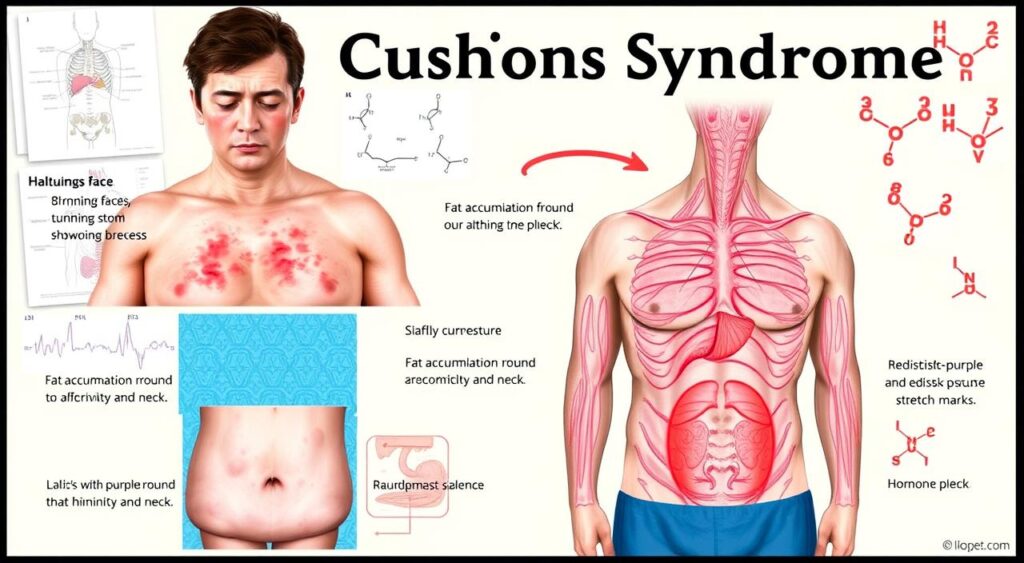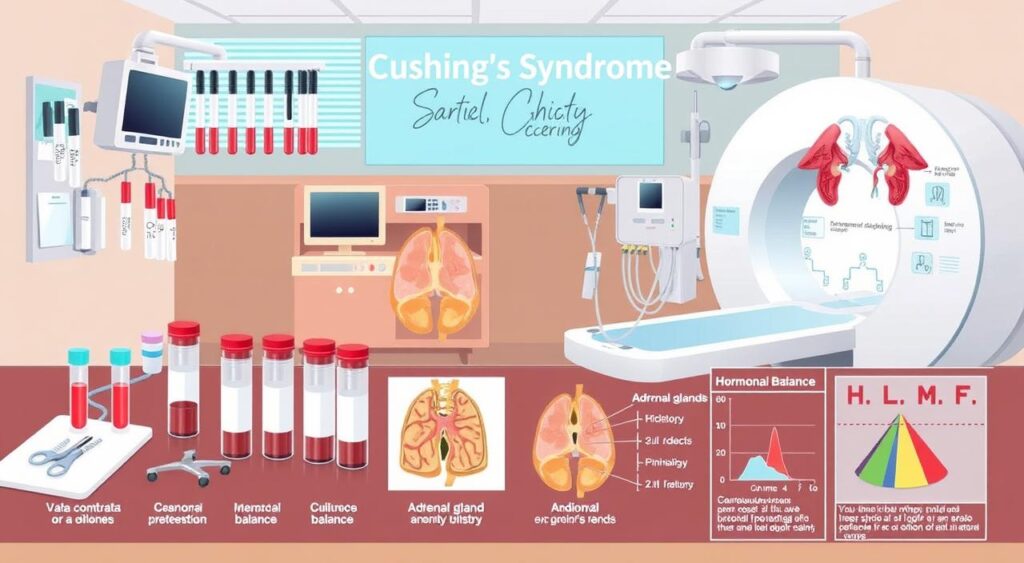Learn about Cushing’s Syndrome, a condition caused by excess cortisol. Discover the signs, diagnosis, and management.
About 2-5 people per million have Cushing’s Syndrome. It’s a rare condition where too much cortisol is made. This leads to serious symptoms that can really affect someone’s life.
It’s important to know what causes it, its symptoms, and how to treat it. Cushing’s Syndrome is complex and needs quick medical help to avoid lasting harm.

Finding out you have Cushing’s Syndrome can be tough. But knowing the symptoms is key to getting better. Signs include gaining weight, high blood pressure, and skin changes.
By understanding these symptoms and getting medical help, people can manage their condition. This can greatly improve their health.
Key Takeaways
- Cushing’s Syndrome is a rare medical condition affecting 2-5 people per million.
- The condition is characterized by an overproduction of cortisol, leading to various symptoms.
- Prompt medical attention is necessary to prevent long-term damage.
- Recognizing the symptoms of Cushing’s Syndrome is crucial for effective treatment.
- Common symptoms include weight gain, high blood pressure, and changes in skin texture.
- Understanding Cushing’s Syndrome can help individuals manage their condition and improve their overall health.
Understanding Cushing’s Syndrome
Cushing’s Syndrome is a hormonal disorder caused by too much cortisol in the body. This happens when the adrenal glands, which make cortisol, don’t work right. Cortisol is important for many body functions like metabolism and blood pressure.
Too much cortisol can cause serious problems. Symptoms include weight gain, high blood pressure, and mood swings. Knowing how cortisol affects the body is key to understanding Cushing’s Syndrome. The adrenal glands are crucial for keeping the body balanced.
Definition and Basic Overview
Cushing’s Syndrome is a rare condition that affects about 2-5 people per million each year. It’s more common in women. Symptoms vary from person to person. Doctors diagnose it by examining the patient, looking at their medical history, and running tests.
The Role of Cortisol
Cortisol is a hormone made by the adrenal glands. It helps the body handle stress. It also controls blood sugar, blood pressure, and the immune system. But, too much cortisol can cause health issues like weight gain and mood changes.
Impact on the Body
Cortisol’s effects on the body can be big. It can cause symptoms like:
- Weight gain, especially in the belly
- High blood pressure
- Mood swings, like anxiety and depression
- Osteoporosis
- Thin, fragile skin
Understanding cortisol’s role is vital for diagnosing and treating Cushing’s Syndrome. Recognizing symptoms and getting medical help is important. This way, people can manage their condition well.
The History and Discovery of Cushing’s Syndrome
Cushing’s syndrome, a rare endocrine disorder, has a rich history. It began in the early 20th century. Harvey Cushing, a famous American neurosurgeon, discovered it. His work in endocrinology showed how cortisol affects our bodies.
Diagnosing Cushing’s syndrome has changed a lot. At first, doctors used symptoms and physical checks. Now, thanks to new tech, like blood tests and scans, doctors can diagnose it more accurately.
- 1932: Harvey Cushing describes the condition in a patient with a pituitary tumor
- 1940s: The role of cortisol in Cushing’s syndrome is discovered
- 1950s: The first diagnostic tests for Cushing’s syndrome are developed
Today, Cushing’s syndrome is seen as a complex issue. It needs a detailed approach for diagnosis and treatment. Endocrinology is key in understanding and managing it. Research keeps improving how we diagnose and treat it.
| Year | Event | Impact on Cushing’s Syndrome |
|---|---|---|
| 1932 | Harvey Cushing describes the condition | Established Cushing’s syndrome as a distinct medical condition |
| 1940s | Discovery of cortisol’s role | Improved understanding of the condition’s underlying causes |
| 1950s | Development of diagnostic tests | Enabled more accurate diagnosis and treatment |
Common Causes of Cushing’s Syndrome
Cushing’s Syndrome has many causes, divided into exogenous and endogenous types. Knowing these causes helps in finding the right treatment and managing symptoms. The pituitary gland is key in endogenous Cushing’s Syndrome. Identifying risk factors is important to prevent it.
Exogenous causes often come from taking corticosteroid medications. This can cause too much cortisol in the body. Symptoms include weight gain, high blood pressure, and mood swings. On the other hand, endogenous causes come from the body’s own cortisol production. This is usually due to a tumor or abnormality in the pituitary gland or adrenal glands.
Exogenous Causes
- Long-term use of corticosteroid medications
- High doses of corticosteroids
- Certain medications, such as prednisone and dexamethasone
Endogenous Causes
Endogenous causes often involve the pituitary gland. It controls cortisol production in the body. A tumor or abnormality in the pituitary gland can cause too much cortisol. This leads to symptoms like weight gain, fatigue, and mood changes.
Risk Factors
Several factors can increase the risk of Cushing’s Syndrome. These include a family history, certain medical conditions, and corticosteroid medication use. Knowing these risk factors helps in taking preventive steps and seeking medical help if symptoms appear.
Recognizing the Signs and Symptoms
Spotting cushing’s syndrome symptoms early is key for the right treatment. Symptoms can differ from person to person. Common signs include weight gain, especially in the belly, high blood pressure, and skin and hair changes. Some may find it hard to get a diagnosis because these symptoms can look like other health issues.
A person with cushing’s syndrome might show many symptoms, like:
- Weight gain and obesity
- High blood pressure
- Changes in skin, such as thinning and bruising
- Changes in hair, such as excessive growth on the face and body
- Mood changes, such as anxiety and depression
Seeing a doctor is vital if these symptoms last. Early diagnosis and treatment can greatly improve life for those with cushing’s syndrome. A detailed medical check-up, including tests and scans, can find the cause and help plan treatment.
By noticing the signs of cushing’s syndrome and getting medical help, people can start managing their condition. Getting a correct diagnosis is crucial for a good treatment plan. It’s important to work with a healthcare team to find the best way to handle cushing’s syndrome.
How Cushing’s Syndrome Affects Different Body Systems
Cushing’s Syndrome is a hormonal disorder caused by too much cortisol. This usually happens because of a problem with the adrenal glands. This extra cortisol can harm many body systems, causing various symptoms and problems.
The effects of Cushing’s Syndrome are wide-ranging. They can affect not just physical health but also mental well-being. Key areas affected include:
- Metabolism: Too much cortisol can change weight and body shape. It can also mess with blood sugar and lipid levels.
- Bone health: Cushing’s Syndrome can raise the risk of osteoporosis, especially in older adults or those with hormonal disorders.
- Cardiovascular health: High blood pressure and heart problems are common. This is because cortisol affects the heart and blood vessels.
- Psychological effects: Mood swings, anxiety, and brain fog are possible. These can really impact daily life.
It’s important to understand how Cushing’s Syndrome affects different body systems. This knowledge helps in managing and treating the condition. By recognizing the signs and symptoms, people can get medical help and take control of their health.
| Body System | Effects of Cushing’s Syndrome |
|---|---|
| Metabolism | Weight changes, blood sugar level changes, lipid metabolism changes |
| Bone health | Increased risk of osteoporosis |
| Cardiovascular health | High blood pressure, cardiac issues |
| Psychological effects | Mood changes, anxiety, cognitive impairments |
Diagnostic Process and Testing
Diagnosing Cushing’s Syndrome involves several steps. First, a doctor will do a physical exam and ask about your medical history. Then, they will run some tests to confirm the diagnosis. This is usually done by an endocrinologist, who specializes in endocrinology.
Tests may include blood work to check cortisol levels. They might also use CT or MRI scans to look at the adrenal glands. Sometimes, more specific tests are needed. These tests help find out why there’s too much cortisol.
Here are some tests doctors might use to diagnose Cushing’s Syndrome:
- 24-hour urine free cortisol test
- Midnight cortisol test
- Low-dose dexamethasone suppression test
Getting a correct diagnosis is key. It helps doctors create a treatment plan that fits you best.

Treatment Options and Approaches
Managing Cushing’s Syndrome needs a personalized plan. The right treatment depends on the cause. Working with a healthcare provider is key to finding the best approach. The main goal is to lower cortisol levels and ease symptoms.
Medications to control cortisol and sometimes surgery to remove tumors are common treatments. Lifestyle changes and stress management can also help manage symptoms and improve well-being.
Medical Treatments
Medical treatments aim to lower cortisol levels. These can include medications that block cortisol’s effects. Such treatments can help with weight gain, high blood pressure, and mood swings.
Surgical Interventions
Surgery might be needed to remove tumors on the pituitary gland. This can help restore normal hormone levels and ease symptoms. It’s important to discuss the risks and benefits with a healthcare provider.
Alternative Therapies
Alternative therapies can also help manage symptoms and improve well-being. These include diet and exercise changes, as well as stress management techniques like meditation and yoga.
| Treatment Option | Description |
|---|---|
| Medication | Decrease cortisol production or block its effects |
| Surgical Interventions | Remove tumors affecting the pituitary gland |
| Alternative Therapies | Lifestyle modifications and stress management |
Living with Cushing’s Syndrome
Managing cushing’s syndrome needs a full plan. This includes lifestyle changes, diet adjustments, and support. People with this hormonal disorder can live well by choosing wisely for their health.
Living with cushing’s syndrome means adopting a healthy lifestyle. This means eating right, exercising often, and keeping stress low. These steps help lessen cushing’s syndrome symptoms and boost health.
Lifestyle Modifications
- Establishing a consistent sleep schedule
- Practicing stress-reducing techniques, such as meditation or yoga
- Engaging in regular physical activity, such as walking or swimming
Having a strong support system is also key. This includes family, friends, and groups. They offer emotional support and connect you with others facing similar issues.
Diet and Exercise
A healthy diet and regular exercise are vital for cushing’s syndrome management. A balanced diet should include fruits, veggies, whole grains, and lean proteins. Exercise helps reduce stress, boosts mood, and increases energy.
| Dietary Recommendations | Exercise Guidelines |
|---|---|
| Eat plenty of fruits and vegetables | Aim for at least 30 minutes of moderate-intensity exercise per day |
| Choose whole grains over refined carbohydrates | Incorporate strength-training exercises into your routine |
By living a healthy lifestyle and getting support, people with cushing’s syndrome can manage their condition well. This improves their life quality greatly.
Prevention and Risk Management
Understanding prevention and risk factors for Cushing’s Syndrome is key. People with a family history or certain health issues are at higher risk. Regular check-ups and screenings are vital, thanks to endocrinology.
Some important steps for prevention are:
- Maintaining a healthy weight
- Engaging in regular exercise
- Following a balanced diet
These habits can lower the risk factors for Cushing’s Syndrome. Those at higher risk should stay in close touch with their doctors. This way, they can quickly address any concerns.

Being proactive in prevention and risk management can help avoid Cushing’s Syndrome. It’s crucial to talk to a healthcare professional, especially an endocrinology specialist. They can help create a prevention plan tailored to you.
Long-term Outlook and Prognosis
Understanding the long-term outlook and prognosis of Cushing’s Syndrome is key. The recovery time can vary based on the person and how severe the condition is. With the right treatment options, many can manage their symptoms and live active lives.
The speed and success of treatment greatly affect the prognosis. Early treatment can greatly improve the outlook, lowering the chance of complications. Regular check-ups and follow-up care are vital to adjust treatments and prevent symptoms from coming back.
Important aspects for long-term Cushing’s Syndrome management include:
- Regular health check-ups to monitor the condition and adjust treatment options as needed.
- Lifestyle changes, like diet and exercise, to manage symptoms and boost well-being.
- Support from family, friends, and groups to deal with the emotional and psychological sides of the condition.
By grasping the long-term outlook and prognosis, those with Cushing’s Syndrome can actively manage their condition. This can lower the risk of complications and enhance their quality of life.
Recent Advances in Cushing’s Syndrome Research
Research in endocrinology has made big strides in understanding Cushing’s Syndrome. Studies are working hard to better diagnose and treat this complex condition. It’s crucial to keep funding research, as it could lead to major breakthroughs and better care for patients.
Recent research has brought us new tools and treatments for Cushing’s Syndrome. These include:
- New tests for cortisol levels that are more accurate
- Exploring new treatments like targeted and gene therapies
- Learning more about what causes Cushing’s Syndrome, including genetics and environment
As endocrinology research keeps growing, we’ll see more progress in treating Cushing’s Syndrome. Supporting ongoing research helps us move closer to a future where this condition is better managed.
Cushing’s Syndrome is a complex condition that needs a detailed approach to diagnosis and treatment. By leading in research and advancements in endocrinology, we can enhance patient outcomes and improve their quality of life.
Conclusion
Cushing’s Syndrome is a complex hormonal disorder that needs careful attention. The journey may seem tough, but there’s hope. Doctors are working hard to understand and treat this condition better.
Getting diagnosed early is key. It helps start treatment early and improves outcomes. If you think you might have Cushing’s Syndrome, talk to your doctor. They can help you through the tests and find the right treatment.
There are many ways to manage Cushing’s Syndrome. This includes medicines, surgery, or a mix of both. With the right support and lifestyle changes, many people have beaten this condition and found their health again.
As research keeps improving, we’ll see even better treatments for Cushing’s Syndrome. By staying informed and proactive, you can play a big role in your health. This way, you can face the challenges of Cushing’s Syndrome and win.
FAQ
Q: What is Cushing’s Syndrome?
A: Cushing’s Syndrome is a hormonal disorder. It happens when the body makes too much cortisol. This condition affects both physical and mental health.
Q: What are the symptoms of Cushing’s Syndrome?
A: Symptoms include weight gain, especially in the belly, face, and upper back. High blood pressure and fatigue are also common. Muscle weakness, easy bruising, and skin and hair changes are other signs.
Q: What are the causes of Cushing’s Syndrome?
A: It can be caused by external or internal factors. External causes are using corticosteroid medications for too long. Internal causes often involve problems with the pituitary or adrenal glands.
Q: How is Cushing’s Syndrome diagnosed?
A: Doctors use blood, urine, and imaging tests to diagnose it. An endocrinologist usually does these tests. They help find out how much cortisol is in the body and what’s causing it.
Q: What are the treatment options for Cushing’s Syndrome?
A: Treatments include medicines to lower cortisol, surgery, and sometimes radiation. The best treatment depends on the cause and how severe it is.
Q: How can lifestyle changes help manage Cushing’s Syndrome?
A: Making dietary changes and exercising regularly is key. These changes can help manage symptoms and improve health. They also support medical treatments.
Q: What is the long-term outlook for individuals with Cushing’s Syndrome?
A: With the right treatment, the outlook is good. But it depends on the cause, how severe it is, and how well it responds to treatment.
Q: Are there any new developments in Cushing’s Syndrome research?
A: Yes, research has made big strides. New diagnostic tools and treatments are being developed. We also understand the condition better now.
